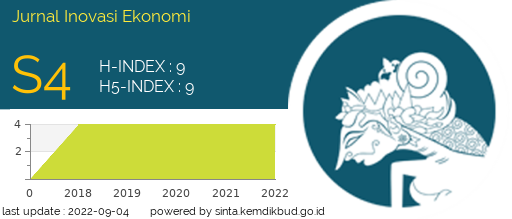Impact of COVID-19 on Pakistan’s services sector
DOI:
https://doi.org/10.22219/jiko.v5i03.12194Keywords:
Pakistan, Covid-19, services sectorAbstract
Coronavirus disease 2019 (COVID-19) affects the world economies as due to pandemic major economic activities are either suspended or restricted. Pakistan also faces the similar circumstances as implementation of lockdown to avoid spread of COVID-19 halted trading activities. This study focuses on the impact of COVID-19 on services sector of Pakistan and for the purpose various published reports are considered. Sectors including tourism, hospitality and transport are likely to be more affected in services sector. Millions of SMEs may not be able to survive in long term due to lack of cash flow while the revenues of SMEs will also decrease. Lockdown situation will give rise to the vulnerable employment and the layoffs in every province of Pakistan are expected. This paper recommends that entrepreneurial-based programs effectively create jobs, especially by promoting information technology and e-commerce.
Downloads
References
ADB. (2020). The Economic Impact of the COVID-19 Outbreak on Developing Asia. Asian Development Bank, Briefs No. 128, March 2020.
Adegun, O. (2014). The Effects of Ebola Virus on the Economy of West Africa through the Trade Channel. IOSR Journal of Humanities and Social Science (IOSR-JHSS) Volume 19, Issue 10, Ver. III
Bloom, E., V. d. Wit, et al., (2005). Potential economic impact of an Avian Flu pandemic on Asia. ERD Policy Brief Series No. 42. Asian Development Bank, Manila. http://www.adb.org/Documents/EDRC/Policy_Briefs/PB042.pdf.
Burkle, F. M. Jr, (2006). Globalization and disasters: Issues of public health, state capacity and political action. Journal of International Affairs, 59(2), 231–265.
Coates, B., Cowgill, M., Chen, T., and Mackey, W. (2020). Shutdown: estimating the COVID-19 employment shock’. GRATTAN Institute.
Evans, S., and Dromey, J. (2020) Coronavirus and the labour market: impacts and challenges. Learning & Work Institute.
Grace O.M. Lee & Malcolm Warner. (2005). Epidemics, labour markets and unemployment: the impact of SARS on human resource management in the Hong Kong service sector. The International Journal of Human Resource Management, 16:5, 752-771, DOI: 10.1080/09585190500083202
Haacker, M., Ed. 2004. The Macroeconomics of HIV/AIDS. International Monetary Fund (IMF), Washington DC.
Hai, W., Zhoa, Z., Wang, J., and Hou, Z. (2004) The Short-Term Impact of SARS on the Chinese Economy. Asian Economic Papers, 3:1.
IATA Economics. (2020, March 24). COVID-19 updated impact assessment. https://www.iata.org/en/iata-repository/ publications/economic-reports/third-impact-assessment/
ICMA. (2020). Economic impact of COVID-19 on Pakistan. Institute of Cost and Management Accountants of Pakistan.
ILO. (2020). COVID-19 and the world of work: Impact and policy responses. International Labour Organization, Monitor 1st Edition, March 2020.
ILO. (2020). The impact of COVID-19 on the tourism sector. International Labor Organization.
Jacobs, L. A. (2007). Rights and quarantine during the SARS global health crisis: differentiated legal consciousness in Hong Kong, Shanghai, and Toronto. Law & Society Review, 41(3), 511–552.
Javed, A. (2019). South Asia’s Services Trade: Barriers and Prospects for Integration. International Journal of Management, Accounting and Economics Vol. 6, No. 10
Javed, A. (2020) Economic Impact of Coronavirus and Revival Measures: Way Forward for Pakistan’ Policy Review, Sustainable Development Policy Institute (SDPI)
Javed, S., and Ayaz, M. (2020). Projected impact of lockdown on SMEs in Pakistan. COVID-19 Policy Review Series, Sustainable Development Policy Institute (SDPI).
Kapiriri, L., & Ross, A. (2018). The Politics of Disease Epidemics: a Comparative Analysis of the SARS, Zika, and Ebola Outbreaks. Global Social Welfare.
KPMG. (2020). Potential impact of COVID-19 on the Indian economy. KPMG,
April 2020.
Lee, A., and Cho, J. (2016). The impact of epidemics on labor market: identifying victims of the Middle East Respiratory Syndrome in the Korean labor market. International Journal for Equity in Health (2016) 15:196 DOI 10.1186/s12939-016-0483-9
Lee, J., and Mckibbin, W. (2004). Estimating the global economic costs of SARS. Chapter 2 in Institute of Medicine. 2004. Learning from SARS: Preparing for the Next Disease Outbreak: Workshop Summary. Washington, DC: The National Academies Press
Maital, S., and Barzani, E. (2020). The global economic impact of COVID-19: A summary of research. Samuel Neaman Institute.
McKercher, B., & Chon, K. (2004). The over-reaction to SARS and the collapse of Asian tourism. Annals of Tourism Research, 31(3), 716–719. https://doi.org/10.1016/j.annals.2003.11.002
McKibbin, W., and Fernando, R. (2020). The Global Macroeconomic Impacts of COVID-19: Seven Scenarios. Australian National University, CEPAR, March 2020
Moghadam, S. R. J., Omidi, N., Bayrami, S., Moghadam, S. J., & SeyedAlinaghi, S. (2015). Ebola viral disease: a review literature. Asian Pacific Journal of Tropical.
Paquin, L. J. (2007). Was WHO SARS-related travel advisory for Toronto ethical? Canadian Journal of Public Health/Revue Canadienne de Sante'e Publique, 209–211.
PIDE (2020). Working from Home in a Smart Lockdown Changing Dynamics of the Labour Market under COVID-19. Pakistan Institute of Development Economics, COVID-19 Bulletin No. 19
Robalino, D. A., C. Jenkins, et al. (2002). The Risks and Macroeconomic Impact of HIV/AIDS in the Middle East and North Africa: Why Waiting to Intervene Can Be Costly. Policy Research Working Paper Series: 2874, 2002. The World Bank.
Sanda, I., Kedir, A., Ngonze, C., and Ikome, F. (2015). Socio-economic impacts of Ebola on Africa. United Nations Economic Commission for Africa.
Shingal, A. (2020). Services trade and COVID-19. VOX CERP Policy Portal, https://voxeu.org/article/services-trade-and-covid-19
Siu, A., & Wong, Y. R. (2004). Economic impact of SARS: The case of Hong Kong. Asian Economic Papers, 3(1), 62–83. https://doi.org/10.1162/1535351041747996.
SMEDA. (2020). Survey report: Impact of COVID-19 on SMEs. Small and Medium Enterprises Development Authority, April 2020
UNWTO. (2020). International tourist arrivals could fall by 20-30% in 2020. Retrieved April 5, 2020, from https://www.unwto.org/news/international-tourism-arrivals-could-fall-in-2020









